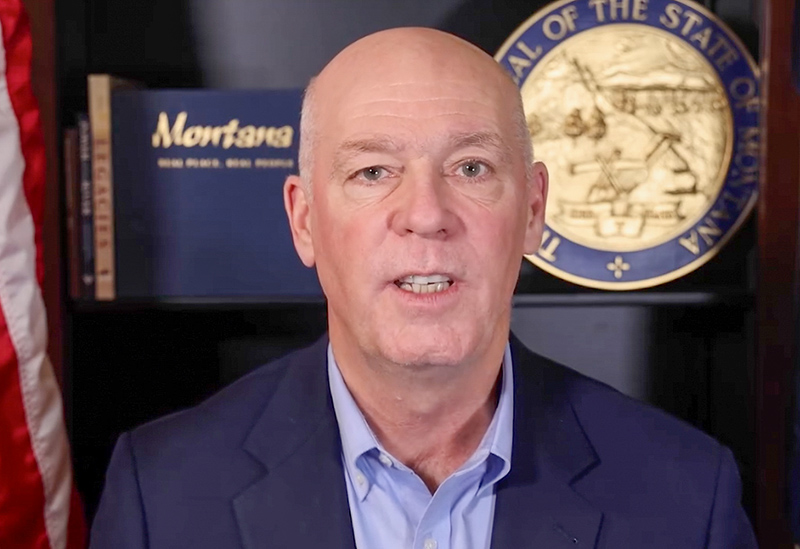Transgender man challenges Iowa’s ban on Medicaid coverage for transition-related surgery
Lawsuit alleges that the ban on Medicaid funds being used to cover transition-related surgery is facially discriminatory and unconstitutional.
By John Riley on April 27, 2021 @JRileyMW

Last Thursday, the ACLU of Iowa filed a new lawsuit challenging Iowa’s ban on using Medicaid funds to cover the cost of medically necessary, gender-affirming surgery for transgender people.
The lawsuit is the third such legal action in the past four years challenging Iowa’s policy of refusing to allow public dollars to be spent on surgical procedures that were initially deemed “cosmetic” at the time the policy was first introduced. But advances in medical science, and in particular, transgender health care, have since shown that gender confirmation surgery may be the best treatment for certain types of gender dysphoria experienced by some transgender individuals.
Filed in Polk County District Court on behalf of Aiden Vasquez, a transgender man from Southeast Iowa, the lawsuit alleges that Iowa’s ban on Medicaid coverage for gender confirmation surgery should be struck down as both unconstitutional and a violation of the Iowa Human Rights Act, provisions of which are intended to prohibit discrimination based on gender identity.
In the lawsuit, the ACLU of Iowa argues that the fact that other Medicaid recipients are able to obtain coverage for medically necessary surgeries, while transgender individuals seeking gender confirmation surgery are denied, means that the ban is discriminatory on its face, and intentionally targets transgender people simply because of their gender identity. Therefore, the ban should be ruled to be unenforceable under the Iowa Constitution and the Iowa Human Rights Act.
In 2018, the Polk County District Court previously ruled in favor of a lawsuit challenging the Medicaid ban on gender-affirming surgery, brought on behalf of transgender women Carol Ann Beal and EerieAnna Good.
In its findings, the court ruled that the ban violated the Iowa Constitution’s guarantee of equal protection and the Iowa Cicvil Rights Act, and issued an injunction barring the state from enforcing its ban.
The state then appealed to the Iowa Supreme Court, which upheld the injunction in March 2019 on the grounds that the policy violated the Iowa Civil Rights Act.
But following that ruling, Iowa’s Republican-run legislature, with support from Gov. Kim Reynolds (R), passed a bill to amend the Human Rights Act to specifically exclude coverage for gender-affirming surgery for Medicaid recipients from the protections against discrimination for transgender people.
In response, the ACLU of Iowa filed its second lawsuit, this time on behalf of Vasquez and Mika Covington, a trans woman from central Iowa, seeking to block the new law.
In August 2020, the Iowa Court of Appeals dismissed the lawsuit on procedural grounds, finding that Vasquez and Covington had not shown that Iowa Medicaid explicitly denied them coverage for surgery. As a result, the court said, they would have to petition the Iowa Department of Human Services, which administers the Medicaid program, for coverage and be denied before proceeding with any legal action.
Since then, Vasquez has been denied coverage for gender confirmation surgery, and Covington is currently awaiting a decision. Once her claim is rejected, she will join the lawsuit as a co-plaintiff.
Related: Iowa trans man will get surgery, but Medicaid ban on surgery remains
Similar bans on Medicaid coverage have been struck down in other states, such as Wisconsin, where a federal judge ruled that Medicaid must cover any care that is deemed medically necessary, including surgical expenses.

Rita Bettis Austen, the legal director of the ACLU of Iowa, noted that even the federal government has eliminated a previous exclusion that prohibited Medicare funds from being used to cover transition-related surgical expenses, declaring Iowa’s policy to be an “outlier.”
“The Polk County District Court judge found back in 2018, in the Good-Beal case, that this policy is a violation of the Iowa Constitution because it facially and intentionally discriminates against people simply because they are transgender,” Bettis Austen said during a virtual press conference announcing the lawsuit. “This law brings significant harm to our clients and others who rely on Medicaid, who desperately need this surgery.”
“And it’s important to realize that this policy has no basis in medicine or in science. Gender dysphoria is a serious medical condition that in some cases puts people at risk for death by suicide and significant distress,” she added, noting that the American Medical Association, the American Academy of Family Physicians, and the American Psychiatric Association all view gender-affirming surgery as a legitimate treatment for gender dysphoria.
“The consensus among major medical associations is that gender dysphoria is a serious medical condition and that surgical treatment is medically necessary for some transgender people, including our clients,” Bettis Austen said. “So I’ll just say we share the frustration that the state keeps putting into place this terrible, discriminatory policy, and we are committed to getting this struck down.”
“I desperately need this surgery,” Vasquez said in a statement. “Having to jump through so many hoops just to try to get coverage for the surgery has been mentally and emotionally very draining and difficult. It’s hard knowing that the state has gone out of its way to discriminate against me and block my medical care just because I’m transgender, when other Iowans on Medicaid are able to get coverage for the surgeries they need.
“I would like everyone to understand that we are not talking about cosmetic surgery or something superficial. This has affected my whole life in a negative way and has threatened my mental well-being,” Vasquez added. “I am a man, but in a body that does not reflect who I am. That’s why this surgery will be life-changing. I have seen too many other transgender people suffer because they are unable to get the care they need.
“I am also involved in this lawsuit to help others. I hope that in suing to get the care I need, we will succeed in forcing the state to do the right thing and end this discriminatory ban so that everyone who needs it can get medically necessary gender-affirming surgery.”

Covington, a University of Iowa student who sits on the patient advisory board of the University of Iowa Hospitals and Clinics, also issued a statement expressing hope that the Medicaid ban will ultimately be overturned.
“It becomes increasingly clear to me: All Iowans, regardless of income level, have the right to have medically necessary health care without discrimination. It’s wrong to deny Iowans on Medicaid like me their medically necessary care just because we are transgender,” Covington said in a statement.
“It’s been more than a decade since I have come out as transgender, though I have known I am female long before that. I am currently forced to live in a body that does not align with my gender, the gender that I am in my mind and in my heart. It affects every aspect of my life, creating tremendous stress that triggers anxiety attacks, anguish, and other health problems. This surgery is literally life-saving for me,” she added. “Being able to finally get the surgery that my doctors have determined is medically necessary for me will do nothing less than give me my life back. It will help me build a life in which my body is in harmony with my gender, so I can overcome the depression, lack of confidence, isolation, and other problems my gender dysphoria causes.”
Courtney Reyes, the executive director of LGBTQ rights organization One Iowa, also blasted the Medicaid ban as discriminatory.
“Everyone in our communities should be able to access the medically necessary care their doctor has prescribed for them, and that includes individuals who are transgender. It can be hard to understand what it means to be transgender, especially if you’ve never met a transgender person,” Reyes said in a statement.
“Transgender Iowans are our friends, family members, and co-workers, and they deserve to be treated with dignity and respect when accessing necessary care. We are proud to support the ACLU of Iowa as it works on behalf of Mika and Aiden, and we are hopeful the court will grant them the equal access they so clearly deserve.”
Read more:
California man will only face 6 months in prison for attacking transgender woman with skateboard
Federal judge dismisses lawsuit challenging Connecticut’s transgender athlete policy
Republican candidate blames his daughter’s bisexuality on Pennsylvania public schools
Montana Governor Signs Anti-Trans Bills into Law
Montana Gov. Greg Gianforte has signed two bills banning transgender people from bathrooms matching their gender and from women's sports.
By John Riley on March 30, 2025 @JRileyMW
Montana Gov. Greg Gianforte signed two anti-transgender bills into law, one of which bars transgender people from public restrooms matching their gender identity and the other banning transgender women and girls from female-designated sports teams.
The laws were passed on party-line votes in both legislative chambers, with Republicans voting in the affirmative.
The first law requires public schools, correctional facilities, other public buildings -- including the state Capitol -- and domestic violence shelters to designate bathrooms, changing facilities, and sleeping areas for a single sex -- male or female. Entry to such spaces will be based on a person's assigned sex at birth, as determined by a person's chromosomal makeup.
Supreme Court Could Pave Way for Return of Conversion Therapy
The Supreme Court will hear a challenge to Colorado's conversion therapy ban and could strike down similar bans across the nation.
By John Riley on March 11, 2025 @JRileyMW
The U.S. Supreme Court has agreed to take up a challenge to a Colorado law prohibiting mental health therapists from subjecting LGBTQ youth to conversion therapy.
The court will hear the case during its next term, which begins in October and runs through June 2026.
Conversion therapy is a practice intended to change a person's sexual orientation or gender identity to align with heterosexual or cisgender norms. Most mainstream medical organizations have largely discredited it as ineffective and potentially even harmful.
Yet, many social conservatives insist that people who hold religious beliefs opposing homosexuality should be allowed to enroll their children, or, in the case of adults, themselves, in the practice.
Ohio Ban on Trans Youth Treatments Blocked by Court
An Ohio appeals court has prohibited the state from enforcing its ban on medical care for trans youth, declaring it unconstitutional.
By John Riley on March 22, 2025 @JRileyMW
An Ohio law prohibiting transgender youth from accessing gender-affirming care has been declared unconstitutional by a state appeals court. The court has permanently blocked officials from enforcing the ban.
On March 18, a three-judge panel of the state's 10th District Court of Appeals overturned a lower court's ruling that allowed the state to enforce the ban, reported NBC News.
The ban on gender-affirming care -- which passed along with a ban on transgender women and girls from participating on female-designated sports teams -- was passed in late 2023 but was later vetoed by Republican Gov. Mike DeWine.
Support Metro Weekly’s Journalism
These are challenging times for news organizations. And yet it’s crucial we stay active and provide vital resources and information to both our local readers and the world. So won’t you please take a moment and consider supporting Metro Weekly with a membership? For as little as $5 a month, you can help ensure Metro Weekly magazine and MetroWeekly.com remain free, viable resources as we provide the best, most diverse, culturally-resonant LGBTQ coverage in both the D.C. region and around the world. Memberships come with exclusive perks and discounts, your own personal digital delivery of each week’s magazine (and an archive), access to our Member's Lounge when it launches this fall, and exclusive members-only items like Metro Weekly Membership Mugs and Tote Bags! Check out all our membership levels here and please join us today!
The Magazine
-
Most Popular
 Signature Honors Mandy Patinkin in Emotional Celebration
Signature Honors Mandy Patinkin in Emotional Celebration  Gay Army Reserve Officer in Uniform Sex Video Scandal
Gay Army Reserve Officer in Uniform Sex Video Scandal  A Potent (and Pricey) 'Good Night, And Good Luck'
A Potent (and Pricey) 'Good Night, And Good Luck'  MISTR's Free DoxyPEP Leads to Huge Drop in STI Rates
MISTR's Free DoxyPEP Leads to Huge Drop in STI Rates  'Gray Pride' Protests Hungary's Ban on Gay Pride Marches
'Gray Pride' Protests Hungary's Ban on Gay Pride Marches  Becca Balint: The Pride of Vermont
Becca Balint: The Pride of Vermont  Police Barge into Walmart Restroom to Confront Butch Lesbian
Police Barge into Walmart Restroom to Confront Butch Lesbian  Jared Polis Signs Law Repealing Colorado's Gay Marriage Ban
Jared Polis Signs Law Repealing Colorado's Gay Marriage Ban  Sarah Snook is Astonishing in Broadway's 'Dorian Gray'
Sarah Snook is Astonishing in Broadway's 'Dorian Gray'  Sniffies CMO Eli Martin On Cruising Into the App Store
Sniffies CMO Eli Martin On Cruising Into the App Store
 Becca Balint: The Pride of Vermont
Becca Balint: The Pride of Vermont  Signature Honors Mandy Patinkin in Emotional Celebration
Signature Honors Mandy Patinkin in Emotional Celebration  MISTR's Free DoxyPEP Leads to Huge Drop in STI Rates
MISTR's Free DoxyPEP Leads to Huge Drop in STI Rates  A Potent (and Pricey) 'Good Night, And Good Luck'
A Potent (and Pricey) 'Good Night, And Good Luck'  Sarah Snook is Astonishing in Broadway's 'Dorian Gray'
Sarah Snook is Astonishing in Broadway's 'Dorian Gray'  'Gray Pride' Protests Hungary's Ban on Gay Pride Marches
'Gray Pride' Protests Hungary's Ban on Gay Pride Marches  Jared Polis Signs Law Repealing Colorado's Gay Marriage Ban
Jared Polis Signs Law Repealing Colorado's Gay Marriage Ban  White House Ignores Reporters with Pronouns in Email Signatures
White House Ignores Reporters with Pronouns in Email Signatures  White House Demands NIH Study Transgender Transition "Regret"
White House Demands NIH Study Transgender Transition "Regret"  Air Force Reverses Ban on Pronouns in Email Signatures
Air Force Reverses Ban on Pronouns in Email Signatures
Scene
Metro Weekly
Washington's LGBTQ Magazine
P.O. Box 11559
Washington, DC 20008 (202) 638-6830
About Us pageFollow Us:
· Facebook
· Twitter
· Flipboard
· YouTube
· Instagram
· RSS News | RSS SceneArchives
Copyright ©2024 Jansi LLC.












You must be logged in to post a comment.